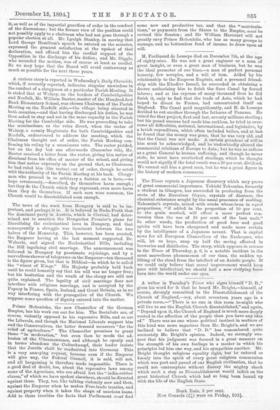The news of the week from Hungary is said to
be im- portant, and perhaps it is. It is believed in Buda-Pesth that the dominant party in Austria, which is Clerical, had deter- mined not to sanction the Hungarian Premier's plans for liberalising the ecclesiastical laws in Hungary, and that aonsequently a struggle was imminent between the two halves of the Monarchy. This, however, has been averted, the Emperor having at the last moment supported Dr. Wekerle, and signed the Ecclesiastical Bills, including the Bill legalising civil marriage. The announcement was followed in Hungary by passionate rejoicings, and by a marvellous shower of telegrams on the Emperor—ten thousand is the figure given, but that is Biblical—in which he is called the "wisest of Kings." His Majesty probably held back until he could honestly say that his will was no longer free ; but his hesitation and the wrath of the clergy are still not quite explained. The legality of civil marriage does not interfere with religions marriage, and is accepted by the Papacy in France, Spain, Ireland, and Great Britain, as in no way interfering with the prerogative of the Church. We /suppose some question of dignity entered into the matter,








































 Previous page
Previous page